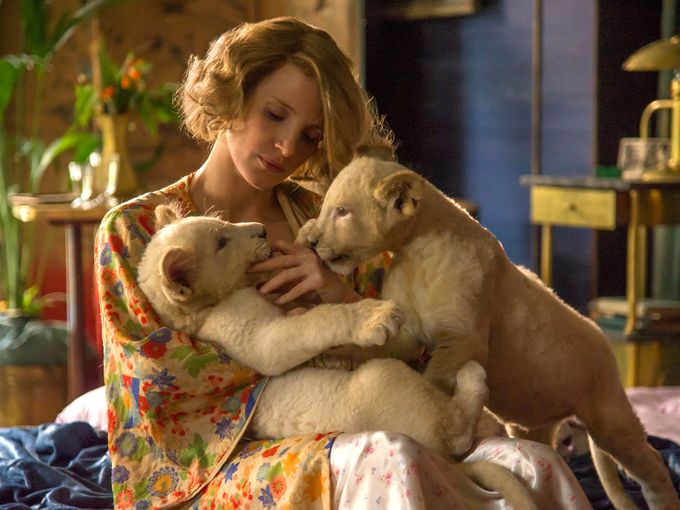
World War II movies never went away, but they’re especially en vogue now. This young year has already welcomed at least three on the art-house circuit — Land of Mine, Fanny’s Journey, Alone in Berlin — while 2016 saw its share of Oscar successes (Hacksaw Ridge), blockbuster failures (Allied) and projects in between (Anthropoid), to say nothing of the masterly, divisive 2015 bleed-over Son of Saul.
Why this spate of interest in films about the rise of fascism, its attendant dehumanizing brutality against innocent Others, and the resistance and war it spawned? You’re way ahead of me here, I know. Think of a five-letter word that rhymes with dump.
This is unfair and probably inaccurate: These projects were greenlit well before nominee Trump descended that escalator to the guffaws of the Beltway. But the shoe fits. Movies reflect a national, even global consciousness, and stories gleaned from the rubble of the worst madman dictator in two centuries can’t help but seem like synchronistic referenda — cautionary tales to apply when appropriate.
The Zookeeper’s Wife, adapted by director Niki Caro (Whale Rider) from a 2007 nonfiction book, is the latest — but not the greatest — reminder of humanity’s sacrificial resolve when confronted with unspeakable horror. It exudes necessary empathy in the face of mounting genocide, and it’s full of sobering, if not particularly singular, snapshots.
The film is set in Poland in 1939, so we know what’s coming. But as the credits roll, Antonina Zabinska (Jessica Chastain) is blissfully unaware, as are the menagerie of animals with which she communes at the Warsaw Zoo. She runs the property alongside her husband Jan (Johan Heldenbergh), and if the opening scenes were animated, they’d be perfect Disney fodder: Antonina cycling through the zoo’s manicured grounds in the early morning, playfully trailed by a galumphing baby camel, exchanging pleasantries with big cats, primates, hippos and motley birds gently rustled from their slumbers by the chiming bell of their favorite person. I half-expected to hear Sheryl Crow’s “Soak Up the Sun” on the soundtrack.
Peace, of course, is short-lived. Within 20 minutes of screen time, the zoo is bombed, the surviving animals fleeing to certain death in the urban wilds of now-occupied Warsaw, or shot for sport by chuckling Nazis. One of them, Lutz Heck (Daniel Brühl), claims to be a fellow animal caretaker, a zoologist on Hitler’s payroll who agrees to spirit Antonina’s most-prized beasts to safety in Berlin, with a promise to return them in peacetime. It’s to Caro’s discredit that Brühl, who has earned the short end of the typecasting stick since he goose-stepped so effectively in Inglourious Basterds, never convinces as a stealth savior in a nest of vipers: We’re on to him well before our heroine is.
But The Zookeeper’s Wife isn’t ultimately about animals. As the German invasion intensifies, and it becomes clear that Poland’s Jews are being corralled like sheep, the Zabinskas develop an ingenious plan to shuttle Jewish children — and eventually entire families — out of the ghettos and into the safety of their basement, under the auspices of a pig-farming operation on the zoo grounds. This act of subversive bravery inspires some undeniably powerful scenes, as when the prepubescent Urszula (Shira Haas), sexually assaulted by German officers and traumatized into silence, gradually regains her speech in the Zabinskas’ refuge.
As the occupation escalates, the film’s clandestine triumphs surround an inevitable accounting of familiar miseries — of families ushered to their deaths on cattle cars, of fatal, echoing gunshots against institutional-gray color schemes. It feels dishearteningly routine under Caro’s lens, but she fully loses us only when The Zookeeper’s Wife begins to adopt the rhythms of a commercial suspense thriller. I don’t expect every Nazi docudrama to feel as free of manipulation as Alain Resnais’ Night and Fog, but Caro’s approach coalesces in some ghastly decisions that cheapen the preceding 90 minutes.
Anchoring everything, the parts both compelling and wayward, is Chastain’s touching embodiment of compassion for mammals of all kinds. The finest scene in the film has nothing to do with Nazism and everything to do with interspecies connection, when Antonina abandons a prewar cocktail party at her zoo to resuscitate a dying baby elephant while simultaneously comforting its frightened mama.
Later, we learn that she managed to save one animal from her shellacked zoo: a rabbit, which becomes a therapeutic tool in Urszula’s recovery. “No one knows how hard it is — a life in hiding,” Antonina tells Urszula, while stroking the bunny’s fur. “You can never tell who your enemies are, who you can trust. That’s why I love animals so much. You can always tell what’s in their hearts.”
Schmaltzy, on-the-nose stuff — but Chastain somehow makes it work.
THE ZOOKEEPER’S WIFE. Director: Niki Caro; Cast: Jessica Chastain, Johan Heldenbergh, Daniel Brühl, Michael McElhatton, Iddo Goldberg, Shira Haas; Distributor: Focus; Rating: PG-13; Opens: Friday at most area theaters